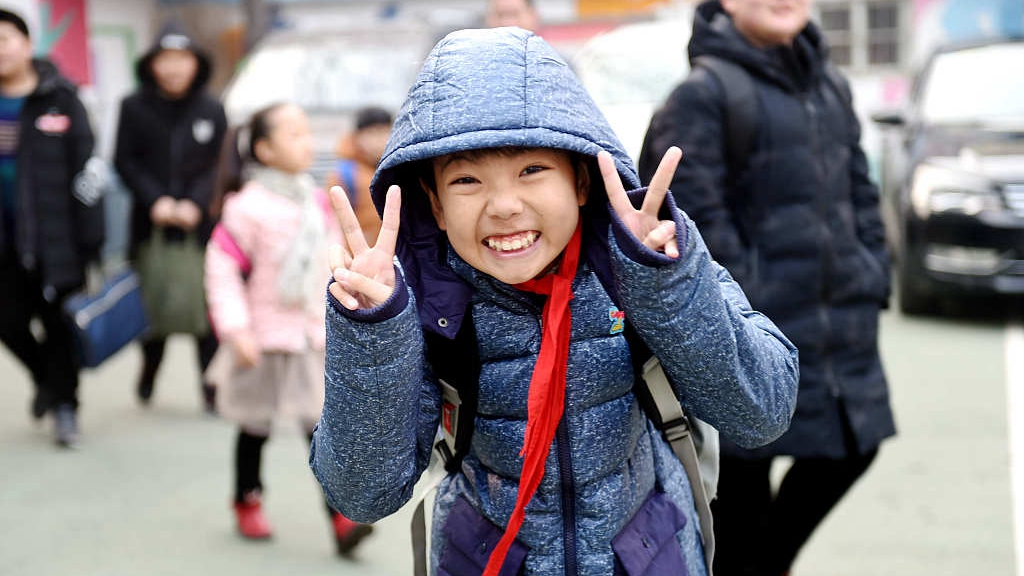
Editor's note: Wang Yan is an associate research fellow of the Graduate School of Education at Beijing Foreign Studies University. The article reflects the author's opinions, and not necessarily the views of CGTN.
The Communist Party of China celebrated its 100th anniversary on July 1st when Chinese President Xi Jinping, also general secretary of the Communist Party of China (CPC) Central Committee, announced that China has reached the goal of building a moderately prosperous society in all respects.
As a matter of fact, education is key to the founding and growth of the Communist Party of China, as it is to the realization of a "moderately prosperous society," or Xiaokang, a central plank of China's modernization strategy/plan.
To start with, in the late 1910s, it was in Peking University when a group of young scholars, including late Chinese leader Mao Zedong, deliberated on/explored the solution to rescuing China out of shambles.
From then until the 21st century, in various policies, plans and strategies formulated by the CPC, education has been given high priority not only as an essential part of people's well-being but also a key driving force of social and economic development. In the same vein, education is one of the highlights in the multidimensional development index of Xiaokang that tracks a wide range of progress in achieving the goal of modernization.
Evidently, over the past 100 years, tremendous progress has been made in delivering education with quality and equity. When the People's Republic of China was founded, 80 percent of the population was illiterate or semi-literate; in contrast, by 2020, nine-year basic education has been made universally accessible, and the majority of school-aged children and adolescents have access to pre-primary education (85.2 percent) and upper secondary education (91.2 percent).
Furthermore, over half of youth (54.4 percent) in China can go to university to pursue an undergraduate education. Indeed, China now boasts the largest higher education system globally and enrolls over 42 million tertiary students.
Such educational development has generated an abundance of human resources for economic growth, underpinning the moderately prosperous society in which everyone could secure a job and contribute to economic and social well-being.
Across the globe, it usually took much more time and a larger amount of resources to achieve such a goal. Notably, China has realized universal compulsory education within a span of two decades, something that usually took hundreds of years in other countries. How has this been delivered?
First and foremost, the well-being and prosperity of the people are central to the governance of the CPC. Over the years, the government has been committed to educational development. As stressed by late leader Deng Xiaoping: "The capacity of our state and the capacity of economic development more and more depend on the quality of workers and on the number and quality of talents; the central government is committed to working on education through enormous efforts, starting with secondary and primary schools." Building on educational thoughts of earlier state leaders, President Xi Jinping has emphasized that China will constantly take education as a development priority.

Children need to do more than just sit exams. /VCG
Children need to do more than just sit exams. /VCG
Furthermore, learning from history and the world, the CPC has identified an array of methods and solutions to address social and economic issues and achieve short- and long-term development in various sectors, including education.
Typically, the evidence-based, participatory approach features education policymaking with a full cycle of survey/investigation, consultation, piloting, amendment and extension. What's more, given the size of the country and variety across the country in terms of developmental levels, care has been taken to balance between centralization and decentralization, emphasizing both unity and diversity to achieve the goal of common development.
More indispensably, the realization of a "moderately prosperous society" is premised on such values and attitudes as aspiration, courage, and confidence as well as tenacity, assiduity and dedication to the rejuvenation of the Chinese nation within a person's capacity.
Central to ethos of education for the 21st century of China, such values and attitudes in relation to self, others and the nation are essentially the legacy of the CPC that has united the Chinese people to dedicate themselves to socialist construction as their shared goal.
This might be best illustrated by Zhang Guimei, the principal of a senior high school in Yunnan, who, at the grand celebration ceremony on July 1, sat at the Tiananmen Square rostrum together with state officials, close to President Xi.
Starting her career as a teacher in rural Yunnan, Zhang Guimei established the first free all-girls high school at the turn of the century and so far has sent approximately 2,000 girls from impoverished families to university. Having lived with cancer for 24 years, she changed not only her own life but also those of thousands of students. In life, she has spent most of her income on the school and the students and led a very simple life throughout her career.
Her position on that day represented the CPC's priority to education, the kind of education that empowers the people with the ability to shape their own futures, as well as the kind of education that has been embedded in the spirit of devoting oneself to the lofty undertaking of the education and well-being of people wholeheartedly.
This is the motto she has created for the school: "I'm not born stream, but high mountain, I will stand at the top of mountains and look down at the ordinary gully; I'm not born to be dirt but talent, I will stand on the shoulders of great men and look down upon cowards."
She is indeed living proof of the values and attitudes of the CPC for education, which has not only sustained the realization of the goal of Xiaokang, but will also continue to power the advancement of China and its people towards a brighter future.
(If you want to contribute and have specific expertise, please contact us at opinions@cgtn.com.)

